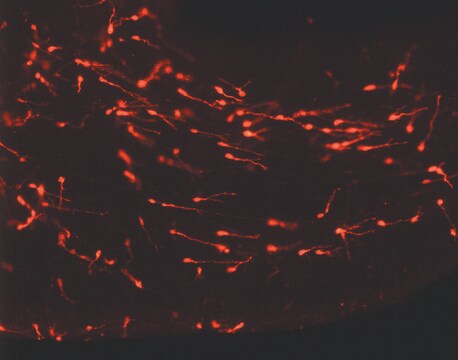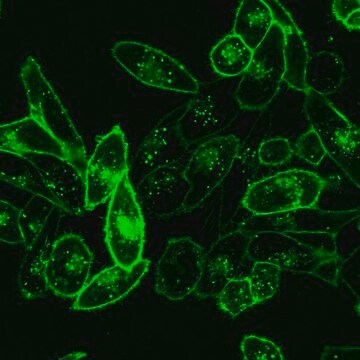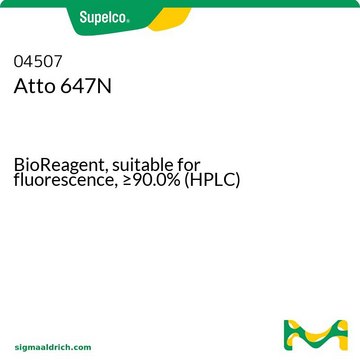18620
Atto 633
BioReagent, suitable for fluorescence
Faça loginpara ver os preços organizacionais e de contrato
About This Item
Produtos recomendados
linha de produto
BioReagent
Ensaio
≥90.0% (HPLC)
Formulário
solid
fabricante/nome comercial
ATTO-TEC GmbH
λ
in ethanol (with 0,1% trifluoroacetic acid)
Absorção UV
λ: 627-633 nm Amax
adequação
suitable for fluorescence
temperatura de armazenamento
−20°C
Aplicação
Atto 633 is a red-emitting fluorescence label with strong absorption, high quantum yield (64%), high photostability, good water solubility, and very little triplet formation. This label is optimized for use with diode laser excitation at 633 nm and characterized by high photostability.
Informações legais
This product is for Research use only. In case of intended commercialization, please contact the IP-holder (ATTO-TEC GmbH, Germany) for licensing.
Código de classe de armazenamento
11 - Combustible Solids
Classe de risco de água (WGK)
WGK 3
Ponto de fulgor (°F)
Not applicable
Ponto de fulgor (°C)
Not applicable
Equipamento de proteção individual
Eyeshields, Gloves, type N95 (US)
Escolha uma das versões mais recentes:
Já possui este produto?
Encontre a documentação dos produtos que você adquiriu recentemente na biblioteca de documentos.
Os clientes também visualizaram
Martin Beutler et al.
European biophysics journal : EBJ, 38(1), 69-82 (2008-09-05)
We demonstrate theoretically and experimentally the quantification of Förster resonance energy transfer (FRET) by direct and systematic saturation of the excited state of acceptor molecules. This version of acceptor depletion methods for FRET estimation, denoted as "satFRET" is reversible and
Sotirios S Tragoulias et al.
Analytical and bioanalytical chemistry, 390(6), 1563-1573 (2008-01-30)
Microarray technology covers the urgent need to exploit the accumulated genetic information from large-scale sequencing projects and facilitate investigations on a genome-wide scale. Although most applications focus on DNA microarrays, the technology has expanded to microarrays of proteins, peptides, carbohydrates
Maria Strianese et al.
Protein and peptide letters, 18(3), 282-286 (2010-09-23)
A new, fast, simple and cost-effective sensing device for monitoring H(2)S has been developed. Proof-of-principle results showing that a commercial and cheap Myoglobin (Mb) can be successfully used as a biological probe for a fluorescence biosensor for H(2)S detection are
Julian Weichsel et al.
Cytometry. Part A : the journal of the International Society for Analytical Cytology, 77(1), 52-63 (2009-11-10)
The actin cytoskeleton modulates a large variety of physiological and disease-related processes in the cell. For example, actin has been shown to be a crucial host factor for successful infection by HIV-1, but the underlying mechanistic details are still unknown.
Thomas D Lazzara et al.
Journal of colloid and interface science, 366(1), 57-63 (2011-10-29)
Anodic aluminum oxide (AAO) substrates with aligned, cylindrical, non-intersecting pores with diameters of 75 nm and depths of 3.5 or 10 μm were functionalized with lipid monolayers harboring different receptor lipids. AAO was first functionalized with dodecyl-trichlorosilane, followed by fusion
Nossa equipe de cientistas tem experiência em todas as áreas de pesquisa, incluindo Life Sciences, ciência de materiais, síntese química, cromatografia, química analítica e muitas outras.
Entre em contato com a assistência técnica





